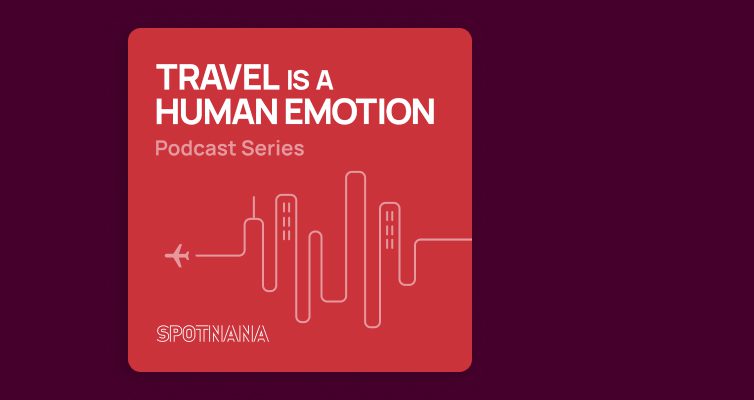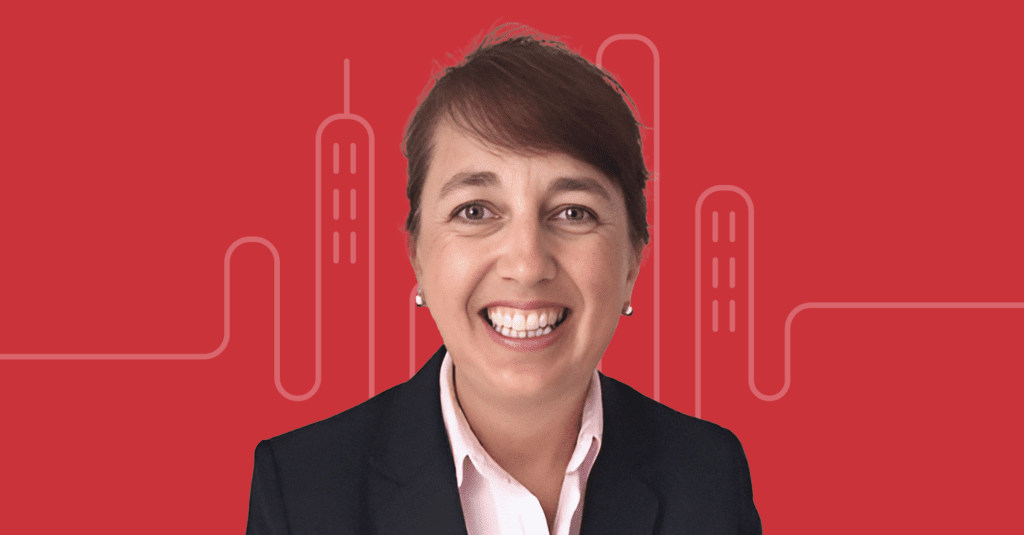Reshaping global travel programs with SAS’ Richard Clowes
Guest: Richard Clowes, Director, Travel Operations at SAS
Host: Johnny Thorsen, VP of Business Development for Content Distribution at Spotnana
Length: 23:10
Richard Clowes joins Johnny Thorsen to discuss the role of modern technology in global travel programs and the power of innovation to improve traveler experiences.
Richard Clowes: There is an opportunity to help our travelers, whether you’re a road warrior or an occasional traveler in the booking tool, because there’s a lot of information that we spit out at them without putting, wrapping it up in some kind of context. We could do a lot there.
Johnny Thorsen: We’re very lucky today to be joined by Richard Clowes, who is the Director of Travel Operations at SAS. And some of you might know SAS, it’s a company that specializes in data and analyzing and working with data. Richard, you are a super qualified travel buyer living inside a data specialist company.
Welcome to the session.
Richard Clowes: Thanks, Johnny. I appreciate you asking me to join.
Johnny Thorsen: How do you look at 2024? What excites you? Do you have any big goals or plans?
Richard Clowes: I think this is a huge year. We’ve both been, as you pointed out, we’ve both been in the industry for a long time. And I guess I should give some background here.
SAS operates as a CTD in the U. S. And then we partner with a TMC globally. And we use probably the leading, currently the leading online booking tool out there for now. And anyway, so we’ve reached a crossroads. And that crossroads has two paths. We follow on the legacy road, if you want to call it that, or we’ve got the new highway to go down.
This is a year of experimentation, of discovery. And, which road do you decide to go down? Do you persevere with the old method and hope that it evolves, or do you just wipe the slate clean? Start with someone new who is writing the path or making that road based on the current technology, not from the technology from 30, 40 years ago.
So I think this is a massive year. I think I’d be curious to see where we’ll be at the end of this year.
Johnny Thorsen: I really think the way you describe and present it represents what a lot of travel buyers out there are currently thinking, right? It really seems like this is a different year than in the past where we might have seen a new premium economy class pop up and become part of the industry because we are at a crossroad, both with new technologies, and with the industry really changing how things are done.
Are there any particular new technologies that excite you right now? Is there anything you’re thinking about? You’re thinking AI or cloud or something you, you really seem to have a much bigger role in your program.
Richard Clowes: Let’s be honest here to anyone listening.
Our current model is broken for the future, and we are piloting right now, Spotnana, and it’s interesting to see the approach, a real discovery, and I’m looking at from the standpoint of a travel agent, a travel manager, and then also the traveler and of course the company’s perspective too.
It is fascinating, refreshing actually to see the concepts that play and at work and to see what works and what’s not. Needs some tweaking yet, we still have a ways to go, but this is all new, right? It gives me some confidence in the future, because right now I’m playing a game of whack a mole with fixing things that are broken.
And that is not exactly a fun role to have and I’d like to be looking forward and I tend to be the glass is half full, right? And one, my vision for the future is such that it shouldn’t matter where the travelers and what booking source that traveler uses, right?
As long as it’s on the corporate tool, I absolutely, as a corporate travel manager, I need them to use the tool, but behind the scenes, I don’t care. As long as we can service it. And that’s key, right? It’s. You can’t just have it fresh booking, right? You’ve got to be able to service it. That is an absolute requirement.
And so it’s refreshing with the airlines who are developing just as quickly, right? It’s a case of keeping up with what they want to do. Can the tools keep up with it? And that’s where we’ve seen the fragmented, the problems just, coming to the surface every day. Even last night I was thrown into a situation where I needed to help a traveler.
I couldn’t even make a hotel reservation using my traditional tools. I had to go direct to the vendor to make them because of problems with the booking tool. And that wasn’t, by the way, the Spotnana pilot tool. So yeah it’s to me, the future will be. We’ve been on a pilot now for a month with Spotnana and in that time we’ve done more NDC bookings with Spotnana than we did in 10 months on the prior set up and that’s with such a small group of travelers in this pilot.
You see some of the announcements from the likes of American about how they plan all their requirements for being a corporate partner. And getting discounts, et cetera, and people being able to get the frequent flyer benefits, et cetera.
And they have requirements about what’s going to be through the GDS and what’s going to be NDC, and traditional EDIFACT. And when I see those percentages, I’m thinking there’s no way we’ll get there in our current model, no way. But potentially we could get that with a different solution in place.
Johnny Thorsen: And first of all, thank you for giving Spotnana a chance to let your travelers try us out. But, today is not to blow our own horn. It is really to talk about the industry challenges, but obviously it’ll be interesting to see what you conclude after the pilot period.
And I know you’ve been following us because you’ve been a frequent guest at some of our webinars, you’ve asked extremely qualified questions. I also know you will be a tough pilot customer for us. And that’s what we need. People who want to drive the change. And it’s a constant triangle right between you, the buyer, the supplier, and then whatever technology you use in the middle that gives you what you want.
But looking at some of the general industry problems for many years, we’ve been struggling with, no single version of the truth. I know you also have talked about that before, right? That there never seems to be one set of data that gives a universal truth. What are your plans or thoughts around getting to that single data view?
Richard Clowes: You’re absolutely right. The current model for us I’ll step back just a few years, right? Prior to a global program in the U.S. we had one GDS, one booking tool, and the data flowed through Compleat and we were live. Everything was all hunky dory. Brilliant. Then we go global. Everything breaks.
There’s this fragmentation out there. Definitely. So you’ve got multiple things at play here. You’ve got the source of the booking. That’s one factor. Is it, is the data, are the data points, the objects, the variables, or whatever you want to call it, are they the same for all sources so that you can create that generic trip object?
Yep. So that’s one piece of it, different data sources mean different qualities of those PNR or trip objects. The other piece of it I think is around online versus offline. We’ve been struggling with that ever since we became global in our current model with missing fields.
The data and then you’ve got the difference between ticketing transactions and live transactions. Where does the reservation sit now? What’s the current state of that reservation for Johnny? Versus, did we issue three tickets? We issued a ticket, we voided it. We issued a ticket, we changed it.
All that. You’ve got to keep up with all those transactional things and it’s all got to be recorded. On an even playing field. And that’s tough. It’s a big ask. I agree. But it’s not going to get any easier. And if we rely on the old traditional methods, I don’t know. I just think it’s a struggle.
I think it’s a tough way to work and expect it to work.
Johnny Thorsen: You said it right. Online offline has been an accepted way of looking at travel programs for 20 years since the online tools arrived. For you, the buyer, it’s actually a frustrating situation, right?
Because that means you have two different ways of doing things. There’s two ways policy has been enforced. There’s two-way data being captured and you need everything to go to the same place. If you want to have a hundred percent view of what’s going on out there.
Richard Clowes: Yeah, you’re totally right. It might be when management asks me a particular question, they’re never asking me how is it bought?
What booking did you see? They’re asking me, who is where right now? Did that guy book that trip yet? And when does he arrive? Where’s he staying? They don’t care and they shouldn’t have to care.
Johnny Thorsen: It should be the same, right? And I think that is one of the things that at least we are moving into that new world where you will hopefully start seeing everything coming in, in one format.
But looking at another interesting trend that’s starting to emerge is travel policy has historically been based on hierarchies in the organization, so senior management could do one thing, others could do something, but companies are starting to create different personas or kinds of groups of travelers based on behavior.
Based on frequency are you playing around with those principles?
Richard Clowes: Yeah, we looked at that, the concept of, we currently have what we call level one and level two. So the one percenters are in the level one, right? And they have a slightly different policy to the level two folks. And we did experiment with the concept of road warriors versus occasional travelers as well, but it was shut down for the time being, but I could see where that could be a factor.
One of the big buzzes in the industry is talking about the return on investment of travel, right? Did you get some value out of that trip? And that value isn’t always. You get a contract, right? You suddenly get, whatever, you were successful in that way. It can be measured.
It can be different things, but at the end of the day, we have to treat the employees fairly so that it doesn’t become a real chore to travel and let’s face it, business travel has got, oh, it’s derailed a little bit, hasn’t it?
Johnny Thorsen: Yes and when you look at that new way of addressing traveler requirements or traveler servicing, you cannot really avoid thinking about sustainability as well.
Because you as a company, have you started? Changing what you buy because of sustainability. Are you more in the way you’re monitoring and observing, but you haven’t made any direct changes?
Richard Clowes: Yeah we’ve certainly talked about it. We’ve been talking about it for a number of years and we’re monitoring it.
We’re providing stats. We even have our own team internally that deals with this, deals with customers requesting to know about our policies around it. So yeah, it’s a big deal for us. People are talking about it. I would say in the U.S. it’s a little difficult, right? Just because the distances are so great.
You don’t really have an option to go from the east coast to the west coast other than flying, right? Not in a timely manner. Airplane fuel, that’s a factor. That’s a big industry problem that they want to solve. It’s hard to differentiate. The tools aren’t doing a great job right now of differentiating between is one hotel better, more green than another, for example, it’s difficult to know to make informed decisions because there doesn’t seem to be a whole lot of standards around it.
I do think in Europe, where rail travel is huge, that’s a great area where we could do more to influence the travelers to take a train instead of flying, when you’re talking about potentially, I don’t know, up to a four hour train journey, it seems like that’s well worth it when you go city center to city center, right?
Versus going to the airport, checking in an hour and a half early, dealing with all that mess, right? So I think there’s a long way to go. We are watching the space, but I’m not sure there’s a whole lot we can do right now in the U. S. That’s just my personal take.
Johnny Thorsen: Yeah, no, and you’re right. And also one thing that I’ve observed is that a lot of global travel managers or travel program owners are more than busy enough.
Dealing with the kind of optimizations of what you buy. Are you prepared to suddenly become a sustainability expert, or do you see this belonging somewhere else in the company? Somebody else will look at these data and make decisions? Is that even being discussed inside SAS?
Richard Clowes: So two things.
The other thing I just wanted to add is, We did have a talk with our preferred car rental vendor in our headquarters location about the idea of electric vehicles and getting them more readily available, but the infrastructure is just not there right now to support that.
When I look out the window at our campus, I see lots of charging stations, right? We’re very progressive in that way. And so it would be logical. Wouldn’t we do the same for our travelers coming in? Let them have an electric car and charge it during the day and in the parking lot.
I think that’s a great idea. The problem is the industry hasn’t caught up with that yet. It’s just not quite there. So that was the one thing as far as If I had to do everything on my own around sustainability, I’d really struggle, but we do have some experts in the company who understand it all.
They are the experts. I’m just a supplier of data. If that’s assuming I get decent data, which I’m struggling with right now. So we go back to the data piece of it. I don’t, I feel for people who have to be experts at it as well, because it’s a complex subject. Yeah. And there’s a lot of hype around it.
Johnny Thorsen: And as a buyer, you are being hit with one angle, which is the suppliers telling you how green they are, because obviously they are all telling a great story at the marketing level, but then at the same time, you have customers. As you said, who are asking hard data about your performance on sustainability.
And that includes travel, especially in a tech company like yours, where travel probably is the biggest emission in the company. So it becomes very important to get it right. So no, it is an interesting trend to just observe how some travel managers go all in. And others are saying, no, I want others to tell me what to do and then I will make it happen.
Richard Clowes: I think part of it, our headquarters are in, we have offices all over the world, but our headquarters are in North Carolina. And pretty much most of our trips to the headquarters were based on a long haul, a long distance, right? So if the headquarters were in the Northeast or New York or whatever, and there was an abundance of train options there, I think it would be more compelling.
And I would certainly be on it more than I am right now. Our Raleigh, New York, Raleigh, Washington are our top two markets, and neither of those are particularly great options for trains at all. Not if you want to do a quick trip.
Johnny Thorsen: That’s true. So obviously ‘24 will be the year of many things, but AI is probably one of the big trends. What are your thoughts and plans on embedding AI technology more into the travel program?
Have you done anything or are you planning anything?
Richard Clowes: Am I planning anything? No, but I’m certainly watching the space. I do think in general there is an opportunity to help our travelers, whether you’re a road warrior or an occasional traveler in the booking tool, because there’s a lot of information that we spit out of them without putting it in some kind of context, we could do a lot there.
I don’t know whether it’s the latest form of AI, the Chat GPT, that stuff. I really don’t know that it’s that kind of opportunity, but it’s more about, hey, Johnny you’re going to Raleigh. 80 percent of our people stay at the Embassy Suites, for example, and 10 percent stay at the Umstead.
You should probably stay there. Now that is useful. When you don’t know the market and you’ve never flown here before, right? You want to be influenced by what others are doing. So your peer network, if we could surface that information up, I think it’s very valuable.
Johnny Thorsen: And like you said, if it’s somebody who has never been there before, they have one information need, whereas somebody who’s been there 10 times in the last two years, you can assume they know how to get in and out of that airport and probably where they want to stay. So it’s about gradating the information delivery based on, like you said, the profile of the traveler.
Richard Clowes: Yeah. There’s some data points that are not captured in the travel process, right? You think about it, you book a flight, you book a hotel, you book a car, or you travel by train.
They’re all measured. They’re all captured. So we can definitely do stuff today. Oh, we should be able to do that today. We just have to surface it, right?
Johnny Thorsen: We are almost at the end of our time, a lot of time that went very quickly I’m not surprised. I knew you would have some great observations to share.
So if you look at ‘24, what would you like to achieve this year? Is there something at the end of the year, you want to say, yep, I managed to get this done. Is there something that stands out or is it more like you said, experimenting and then deciding next year?
Richard Clowes: There’s two, I guess there’s two things.
I want to have confidence. Let’s talk really big picture, right? I want to have confidence for the future, for the next 10 years, that whatever we do, it’s future-proofed. And that’s difficult to say, right? Because we don’t control what vendors are going to do, etc. But it’s a confidence factor because I have lost my confidence in our current setup.
Sad to say. I probably shouldn’t air all our dirty laundry, but I’m admitting it, right? I’ve lost confidence. I need to find that confidence. How am I going to do that? That’s where I’m shopping the market a little bit to figure out. What the best tool forward is for us that can solve these problems.
And not just in the U.S. it has to be global for us. We’re a global company. We’ve got to solve it globally too. So there you go. Two things.
Johnny Thorsen: Thank you very much for joining me today. Really appreciate it.
Richard Clowes: Thank you, Johnny. I appreciate it. Thanks again for inviting me.






